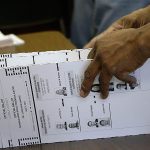
Remembering John Kinsel Sr., a Navajo code talker and community pillar
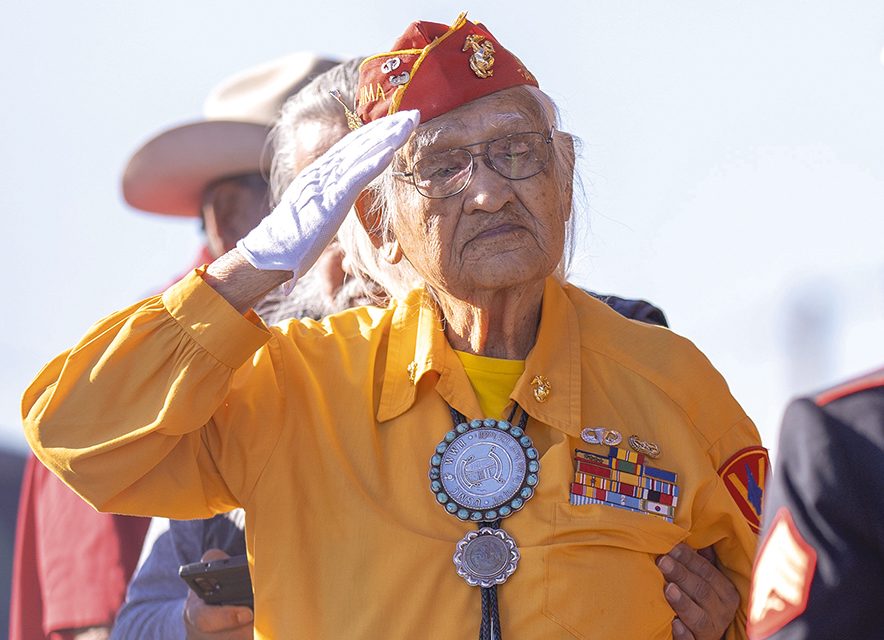
Special to the Times | Donovan Quintero
Navajo Code Talker Thomas H. Begay gives one final salute to his longtime friend and fellow Navajo Code Talker John Kinsel Sr., on Wednesday in Chinle. Kinsel passed at his home in Lukachukai, Ariz., on Saturday morning.
LUKACHUKAI, Ariz. — The remarkable upbringing of John Kinsel Sr., a man whose life journey mirrored the struggles and triumphs of a generation. Growing up as a Navajo boy in the 1920s and 1930s, John faced challenges that would shape his character and ultimately guide him into military service during World War II.
Ronald Kinsel, the eldest son of the late Navajo code talker, recounted how his father’s family, despite experiencing the Great Depression, was largely unaware of its impact.
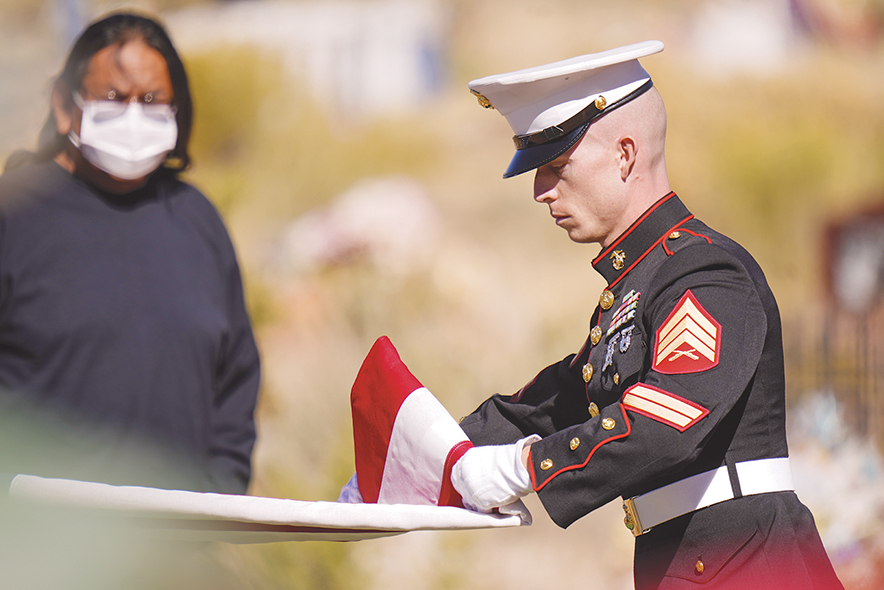
Special to the Times | Donovan Quintero
A member of the Marine Corps Honor Guard carefully folds the flag that was draped over the casket of the late Navajo Code Talker John Kinsel Sr., on Wednesday in Lukachukai, Ariz.
“Dad always said we had livestock and food, so it didn’t feel like there was a depression,” Ronald explains. In a family of six – his mother, two sisters, a younger brother, and himself – John learned early on to survive and adapt.
Tragically, his father passed away when he was just a child, leaving him without a father figure to guide him through the challenges of life.
Harsh realities, raising dust
John’s early education began in 1927 at a boarding school in Fort Defiance, where he endured harsh realities.
“He faced bullying, severe discipline, and inadequate food,” Ronald shared on Tuesday morning during funeral services that were held at the Our Lady of Fatima Catholic Church in Chinle.
Named John Williams by the school, he took on his father’s last name, Harvey, and struggled to learn English in an environment that often felt unfriendly. Yet, this experience laid the groundwork for his resilience.
From 1934 to 1936, John attended St. Michaels Indian School, a Catholic institution that would become a significant part of his identity. Graduating from eighth grade, he particularly cherished the religious ceremonies that helped him learn English through constant prayers and songs. Following that, he furthered his education at St. Catherine Indian School in Santa Fe, New Mexico, where he graduated high school on May 26, 1941—just months before the United States entered World War II.
Reflecting on his father’s childhood, Ronald vividly described the family’s move from Cove, Arizona, to Lukachukai, where they eventually settled on land homesteaded by John’s grandfather.
“The community was small then – nine to ten families spread over a few miles,” he recalled his father telling him.
Life revolved around close-knit relationships; families visited and helped each other, creating a strong sense of unity.
“There wasn’t any government help back then. My grandfather always said, ‘One day this place is not going to be like this. There will be a great change,’” Ronald recalled his father saying what his grandfather’s foresaw about the future of Lukachukai.
Transportation during that era was limited. Ronald remembers his father speaking of the occasional sighting of a Model T car raising dust around Lukachukai—a rare spectacle amid a world dominated by horses and wagons. Even so, the Kinsel family thrived with their sheep, goats, and horses, remaining blissfully unaware of the struggles affecting others during the Great Depression.
Valuable life lessons, willpower
John’s grandfather imparted valuable life lessons, teaching his father about toughness, patience, and willpower, which became foundational to how he approached life, school, and military service, Ronald explained.
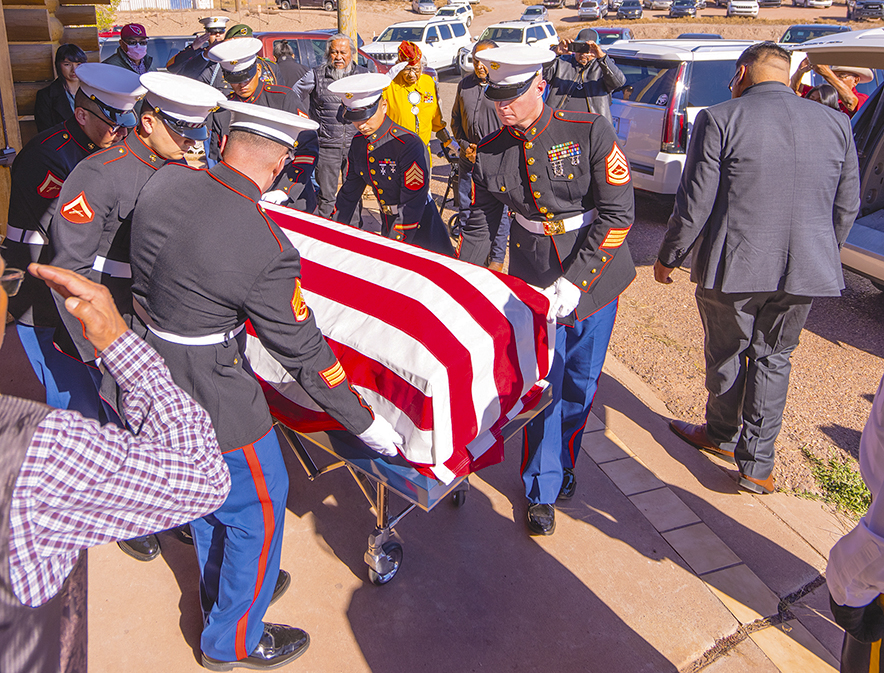
Special to the Times | Donovan Quintero
Marine Corps Honor Guard carefully maneuver the coffin of Navajo Code Talker John Kinsel Sr., while fellow Navajo Code Talker and longtime friend Thomas H. Begay gives one final salute on Wednesday in Chinle.
Running was emphasized as a morning ritual, a way to connect with the Holy People and accumulate strength and wealth.
“Running was emphasized and done by morning stars; (he) rose and ran, hollering so the Holy People could hear,” Ronald shared.
This wisdom stayed with John and influenced his outlook during the war. As a code talker, he carried the teachings of his youth into battle, remembering his grandfather’s advice to act swiftly and decisively.
Remembering Pearl Harbor, enlisting in U.S. Marines
Ronald said his father had not yet graduated from high school when Pearl Harbor was bombed on Dec. 7, 1941.
“Pearl Harbor was bombed five months before he graduated from high school,” he said. “Within nine months of World War II, a lot of Navajos were off the reservation working on the railroad and the shipyards.”
In his youth, Kinsel, who was Kinłichíi’nii, born for Tábąąhá, whose maternal grandfathers were Naakaii Dine’é, and whose paternal grandfathers were Bit’ahnii, was a recent high school graduate uncertain about his future. One day, John and a friend named Benjamin Sorrel were walking down a street when they saw two U.S. Marines.
“My father, said, ‘One day, another person and I (Benjamin Sorrel) were walking down the street and noticed a couple of Marines approaching us. And it was Benjamin Sorrel who told them we wanted to join the Marines. On October 10, 1942, we were sworn in and instructed to return home in a couple of weeks to notify our families,” Ronald shared his father’s story of how he became a Marine.
He later revealed to his mother that he had enlisted in the Marine Corps. Before he left for boot camp, his family organized a traditional blessing ceremony aimed at ensuring his protection during wartime.
“His mother cried as he was the only son she had. But later his mother accepted him joining the Marines, and she knew what to do regarding the ceremony,” Ronald eulogized. “For that particular reason, she hired a traditional chanter and had a very powerful ritual done for Dad about a warrior.”
Kinsel believed the Navajo ceremony was instrumental in keeping him from the front lines; despite suffering a leg injury and enduring bouts of malaria, he returned home safely, Ronald shared.
Serving valiantly, defending country
The date of service is October 1942 to January 1946 his battles and campaigns included Bougainville, Guam Guadalcanal, and Iwo Jima.
From 1942 to January 1946, he served valiantly in the 9th Regiment, 3rd Marine Division, through some of the war’s most intense battles, including the fierce confrontation at Iwo Jima. He also saw action in Bougainville, Guam, and Guadalcanal. He would eventually be awarded a Purple Heart for injuries sustained on March 2, 1945.
Kinsel had his first combat experience during the Battle of Bougainville. He later shared with his son the intensity of the jungle fighting. Following that, he participated in the Battle of Guam, where the 3rd Marine Division encountered heavy resistance on the beaches and throughout the island. Guam was liberated in February 1945. Kinsel also took part in the Battle of Iwo Jima, where he and his regiment landed as reinforcements.
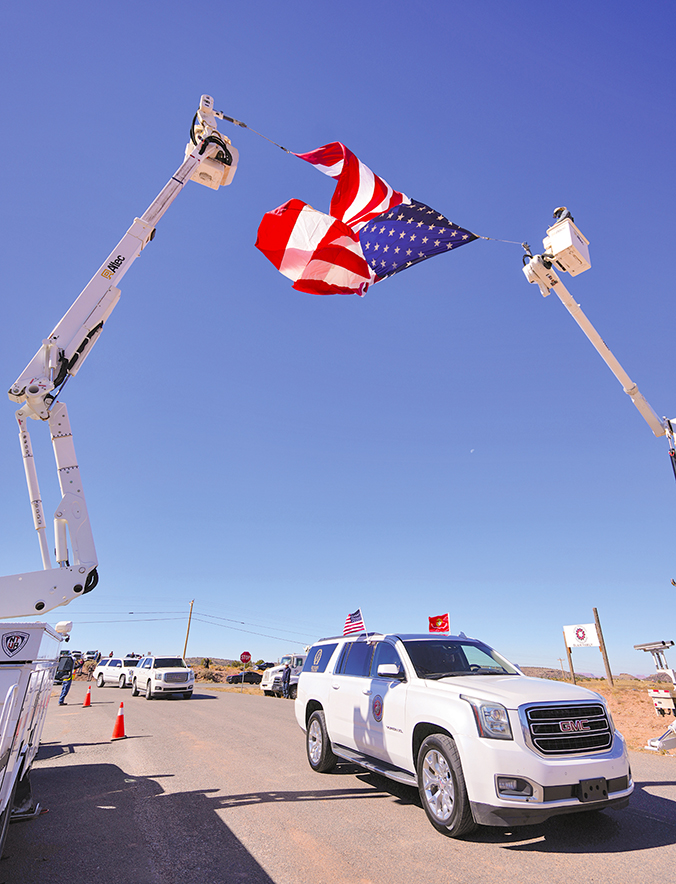
Special to the Times | Donovan Quintero
A vehicle transporting the casket of the late Navajo Code Talker John Kinsel Sr., drives under a flag placed there by Navajo Tribal Utility Authority on Wednesday in Lukachukai.
Under intense fire on the sixth day of fighting on the island, Kinsel was wounded by falling rocks. Ronald said his father said the Japanese had set up bombs that caused a large explosion to happen inside a cave.
“Dad had to wait on the beach for a day for medical evaluation,” his son Ronald shared. “He broke his ankle. Once he was safely on the board on a Navy hospital ship, a fellow Navajo who worked on the dock, brought him, brought him a cake and ice cream.”
He was sent back to the States as a radio communicator and was discharged from active duty.
“My dad was a brave young man when he took the oath to defend our country. In doing so, he used the Navajo language to defeat the enemy of the United States,” Ronald shared. His legacy will live on as one of our heroes. This is what he said once: ‘I volunteered and didn’t know anything about code talkers being recruited. All they wanted was some Indians, Navajos.’”
Devoted family man, developing code
Ronald shared poignant memories of his father, highlighting not only his military achievements but also his role as a devoted family man and community advocate.
“My dad lived a long life because he was blessed, and he always attributed it to our family’s traditions,” Ronald said.
He noted that the significance of his father’s birth date in Catholic records may have played a role in his longevity, allowing him to witness significant changes and challenges throughout the years.
During his time in the service, Kinsel contributed significantly to the development and transmission of an unbreakable military code based on the Navajo language. This innovative communication strategy played a crucial role in facilitating secure messages between American troops during the war.
Kinsel helped create various code terms, such as “rabbit trail” for “route,” “turtle” for “tank,” and “bird carrier” for “aircraft.” His ingenuity maintained stealth and effectiveness in military operations against enemy forces.
Community advocate recognized for bravery
After returning home in early 1946, Kinsel continued to serve his community, working for the Bureau of Indian Affairs and inspiring young athletes as a basketball coach. His dedication to the Navajo community extended beyond sports; he tirelessly advocated for the recognition of the contributions and sacrifices made by Navajo Code Talkers and worked to ensure their stories were not forgotten.
Kinsel was recognized for his bravery and service late in life. In 1989, he received the Purple Heart for his injuries from Iwo Jima, and in 2001, he and his fellow code talkers were awarded the Congressional Silver Medal, a testament to their pivotal role in American history.
Fellow Navajo Code Talker Thomas H. Begay from Chéch’iltah, New Mexico, saluted his friend one last time as the Marine Corps Honor Guard carried his casket into the church.
His son, Ronald Begay, left their home early in the morning to make it to the funeral services so that his father could pay his last respects to his longtime friend.
“We drove in early this morning to pay his respect to Mr. Kinsel, who was my dad’s comrade in arms and Battle of Iwo Jima hero, both of them fought in the same in the battle of Iwo Jima,” Thomas Begay’s son shared.
Ronald Begay said his father was an agency superintendent in Chinle when John was a federal employee with Lukachukai and Chinle school districts.
“So, they have known each other for a long time,” he said.
Continuing the legacy
Ronald said his father has been on the road, having recently returned from San Antonio, Texas.
“He’s been traveling, continuing the legacy by participating in reunions. The recent one was the fifth Marine Division review in San Antonio, Texas. We’re scheduled to go to Seattle next month for Veterans Day, also to honor the legacy of the Navajo Code Talkers,” said Ronald Begay. “But overall, he’s doing fine and continues to show his support of all veterans, especially Navajo Nation.”
Filvert Kinlichee, who wanted to pay his respects as well, stood silently along U.S. Highway 191, with his hand over his heart. He said he went for a run before honoring the Navajo warrior.
“I have the utmost respect for all of our military service. That’s why I went for a run today and paid my respects,” said Kinlichee, whose father Filbert Kinlichee is a Vietnam veteran who served from 1968-1970 in the U.S. Navy.
Linda Yonnie, who lost her father, the late Navajo Code Talker Pastor Lemuel Bahe Yazzie, in 2010, paid her respects and said her father and Mr. Kinsel were friends, along with MacDonald and Begay.
Yazzie joined the U.S. Marine Corps on Sept. 21, 1944, and served as a radio telephone operator in the 4th and 6th Marine Divisions from July 22, 1945, until March 30, 1946. Though their paths crossed during the war, each man’s journey afterward highlighted their unique contributions beyond military service.
“He was a boxer and Peter MacDonald Sr.; he was his water boy in China. So, they could speak Chinese. MacDonald and him always go ‘ding hao’ means good, and “wu hao” means bad. But he said they had a lot of fun and just enjoyed serving their country,” she remembered.
MacDonald, who attended services for Kinsel said he didn’t know him until after the code was declassified.
“I didn’t get to know John until after the code was declassified. None of us knew who served until 1968 because it was still top secret,” said MacDonald. “So only once I know is the one that was in my unit.”
Macdonald said he knew Peter Sandoval and Alfred Leonard from Lukachukai.
“Those two guys were like my big brothers. You know, I went in 15 (years of age), I was 16, and they took care of me. They knew I was a young guy, and I went to boarding school with them in Shiprock. That’s how I got to know them,” he said.
John’s dedication to service was further recognized in 2002 when he received the Congressional Silver Medal for his Marine service. Yazzie passed away peacefully at home in Whitecone on May 28, 2010, at the age of 93.
Kinsel was laid to rest at the Lukachukai Community Cemetery. Afterward, friends and family gathered at the Lukachukai Chapter House and held a reception in honor of his memory.

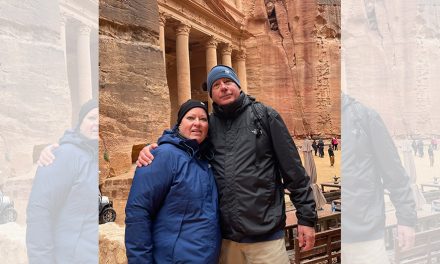






 Highway 264,
Highway 264, I-40, WB @ Winslow
I-40, WB @ Winslow